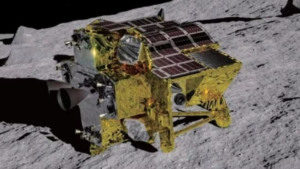The celestial race for lunar exploration, Japan has joined the exclusive club of nations capable of soft-landing spacecraft on the Moon. The Japan Aerospace Exploration Agency (JAXA) proudly announced on Friday that its Smart Lander for Investigating Moon (SLIM), aptly nicknamed the “Moon Sniper,” made a successful touchdown on the lunar surface at 8.50 PM IST. However, despite the triumphant landing, the Moon Sniper encountered a major hiccup – its solar cells are failing to generate power.
With this achievement, Japan becomes the fifth member of the elite group of nations that have soft-landed spacecraft on the Moon, joining the ranks of the United States, the former Soviet Union, China, and India. Hitoshi Kuninaka, the head of JAXA’s research center, revealed in a press conference that SLIM is currently relying solely on its battery, and efforts are underway to prioritize the transfer of critical data back to Earth.
Even with “life-sustaining treatments,” such as deactivating the spacecraft’s heater, the batteries can only endure the harsh lunar conditions for a few hours. JAXA remains hopeful that a change in the sunlight’s angle will illuminate the panels adequately, potentially restoring functionality to the beleaguered lunar explorer.
The SLIM mission earned its moniker, the Moon Sniper, by aiming for an unprecedented precision in its landing—within a mere 100 meters of its target. This remarkable feat stands in stark contrast to conventional spacecraft, which typically achieve accuracy within a range of several kilometers. JAXA believes that this cutting-edge technology could revolutionize future lunar exploration, providing access to hilly lunar terrains that may harbor essential resources like oxygen and water. These life-sustaining elements also hold significant potential as fuel sources for future rocket missions.
Despite the solar cell setback, SLIM has outperformed some of its counterparts. Astrobiotic’s privately-built Peregrine lander, for instance, encountered a critical issue post-launch, leading to its incineration in Earth’s atmosphere. Japan’s entry into the lunar exploration arena marks a significant milestone, as its spacecraft touched down on the lunar surface early Saturday, making it the fifth country in history to reach the Moon. However, the looming power supply dilemma has cast a shadow of uncertainty over the mission’s future.
Officials acknowledge the need for additional time to assess whether the spacecraft achieved the coveted pinpoint landing—a key objective of the Moon Sniper mission. While the absence of astronauts onboard diminishes the immediate human risk, the mission’s success hinges on overcoming the power challenge and extracting valuable insights from this groundbreaking lunar endeavor. As Japan navigates the lunar landscape, the world watches with bated breath, awaiting the outcome of this technological odyssey.
